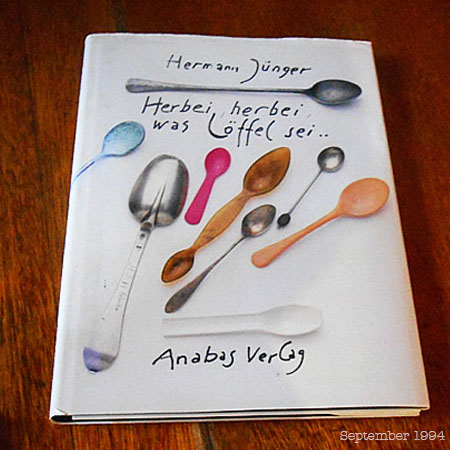 BIOGRAPHY: Herman Jünger was born in Hanau 1928 and he died at the age of 76 in his house in Pöring east of Munich In 1947, after his high school diploma in Hanau, Hermann Jünger graduated from the state academy of academies Hanau from 1947 to 1949 and graduated as a silversmith with the journeyman's examination ..... In the period from 1949 to 1962, Hermann Jünger worked in various workshops and factories in Bremen , Heidelberg , Ziegelhausen, Geislingen at the Steige ( WMF ) and at Wilhelm Wagenfeld . During this period, he also finished his studies at the Academy of Fine Arts in Munich from 1953 to 1956 with Franz Rickert, and from 1953 to 1957 he produced designs in porcelain for the company Rosenthal . From 1956 to 1961 he ran his own workshop in Munich.
BIOGRAPHY: Herman Jünger was born in Hanau 1928 and he died at the age of 76 in his house in Pöring east of Munich In 1947, after his high school diploma in Hanau, Hermann Jünger graduated from the state academy of academies Hanau from 1947 to 1949 and graduated as a silversmith with the journeyman's examination ..... In the period from 1949 to 1962, Hermann Jünger worked in various workshops and factories in Bremen , Heidelberg , Ziegelhausen, Geislingen at the Steige ( WMF ) and at Wilhelm Wagenfeld . During this period, he also finished his studies at the Academy of Fine Arts in Munich from 1953 to 1956 with Franz Rickert, and from 1953 to 1957 he produced designs in porcelain for the company Rosenthal . From 1956 to 1961 he ran his own workshop in Munich.
FOR 18 years, from 1972 to 1990, he was a professor at the Academy of Fine Arts in Munich and was elected a member of the Bavarian Academy of Fine Arts in 1982 . Hermann Jünger was one of the most internationally renowned representatives of his field.
• Beginning in 1953 he studied for three years at the Academy of Fine Arts Munich at the gold and silver with Franz Rickert
• 1968 Participation in the 1st International Symposium for Silver Jewelry in Jablonec, CSR
• 1972 Appointed to the Academy of Fine Arts in Munich as successor to Franz Rickert
• 1982 Election as a member of the Bavarian Academy of Fine Arts
• 1990 Teaching at the Munich Academy
 Herman Jünger has work in museums worlwide: Frankfurt, Hamburg, Hanover, Jablonec, Cologne, London, Melbourne, Munich, Perth, Pforzheim, Prague, Sydney. He is well known for his statement, "my statement is my jewellery". Likewise, his statement as a teacher are his students and as a collector what he had to say about collecting is his collections. Jünger's spoon collection quite apart from being an interrogation of the 'spoon form' it also interrogates 'materiality'. His book on his 'spoon collection' is an eloquent 'statement' that operates at many levels and that speaks of many things. Within this book Jünger explores the use of bone and horn in 'spoon making' and the narratives invested invested in a spoon and the horn and bone.
Herman Jünger has work in museums worlwide: Frankfurt, Hamburg, Hanover, Jablonec, Cologne, London, Melbourne, Munich, Perth, Pforzheim, Prague, Sydney. He is well known for his statement, "my statement is my jewellery". Likewise, his statement as a teacher are his students and as a collector what he had to say about collecting is his collections. Jünger's spoon collection quite apart from being an interrogation of the 'spoon form' it also interrogates 'materiality'. His book on his 'spoon collection' is an eloquent 'statement' that operates at many levels and that speaks of many things. Within this book Jünger explores the use of bone and horn in 'spoon making' and the narratives invested invested in a spoon and the horn and bone.
The Book
1
4
5
67
8
9
Herman Jünger was an advocate for the German concept of "vollkommenheit". The translation being to do with completedness and wholesomeness – a 'perfect' state when all pieces/things come together. "Perfection" is what the dictionary says but vollkommenheit is somewhat different in regard to 'cultural sensibilities'. Jünger when teaching used the metaphor of the "quail's egg and the ball bearing". "Vollkommenheit" being the perfection that exceeds 'measurability' and 'perfection' being definitively measurable – absolute and black and white, unambiguous.
Culturally, vollkommenheit exceeds perfection. Natural materials, here horn and bone, become more 'durable' in a vollkommenheit kind of way with their 'imperfections' contributing to the completedness and wholesomeness adding to their durability and the narratives they carry.












No comments:
Post a Comment